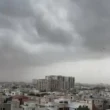Protests, Karachi, Pakistan, Electricity Price Hike, Jamat-e-Islami, Inflation, Government Taxes, Power Tariff Increase, Traders’ Protest, Economic Crisis, Social Media, Fuel Adjustment, Consumer Bills, Resistance.
Rewritten News Story: A wave of protests has surged through various cities in Pakistan, with Karachi at the forefront, as citizens express their frustration against the substantial surge in electricity prices. The escalating costs have added to the hardships faced by a population already grappling with inflation.
The call for these protests was initiated by Jamat-e-Islami, leading to demonstrations in Karachi, Rawalpindi, Attock, Gujranwala, and multiple other urban centers across the nation. The protestors unitedly demand the government to reverse the imposition of additional taxes on electricity and the recent escalation in power tariffs.
In Karachi, traders also actively participated in the protests, some even resorting to setting their electricity bills on fire as a symbol of their dissatisfaction. Addressing the rally, Hafiz Naeemur Rehman, the emir of JI Karachi, issued a warning, stating that the situation could intensify if the government continued to burden the populace. He emphasized, “We will resist if anyone tries to disconnect our electricity supply,” and urged the government to target landowners instead of placing financial strain on the already struggling citizens.
Attique Mir, the Chairman of All Karachi Trader Union, pledged that they would initiate a “jail bharo” (fill the jails) movement if any trader was arrested during the protests. He asserted that the traders’ participation underscored the deepening economic crisis. Mir declared that the protest against the electricity price hike would persist until the government addresses their demands.
In Rawalpindi, citizens assembled for a protest on Murree Road following Friday prayers, expressing their dissatisfaction and raising slogans against the Islamabad Electric Power Supply Company.
The intensity of the protests echoed in other cities, with social media videos capturing citizens setting their electricity bills on fire as an act of protest.
Earlier, in Gujar Khan, a city in the Rawalpindi district, residents ignited their electricity bills in defiance of the escalating power tariff amidst soaring inflation.
Amidst these protests, the National Electric Power Regulatory Authority (Nepra) authorized a Rs5.40 per unit increase in power tariff, citing quarterly fuel adjustment.
Amid the widespread outrage, a resident of Karachi was astounded to receive a bill of Rs3,747 for consuming merely two units of electricity, amounting to Rs1873 per unit. The bill included various charges such as fuel adjustment, surcharge, uniform adjustment, sales tax, and electricity duty. Despite approaching Karachi Electric for a correction, the citizen’s plea was dismissed by the company’s staff. The escalating discontent reflects the urgency for the government to address the soaring electricity costs that are impacting citizens across the country, particularly in Karachi.










